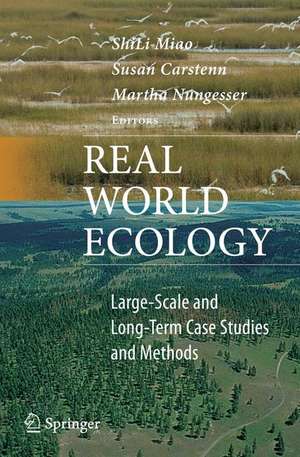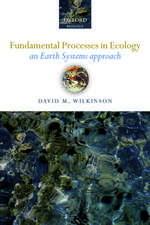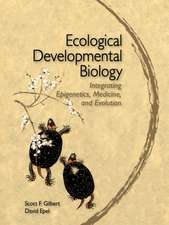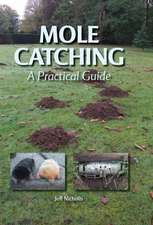Real World Ecology: Large-Scale and Long-Term Case Studies and Methods
Editat de ShiLi Miao, Susan Carstenn, Martha Nungesseren Limba Engleză Paperback – 18 dec 2008
* Lack of randomization, replication and independence
* Multiple scales of spatial and temporal variability
* Complex interactions and system feedbacks.
In real world ecology, standard replicated designs are often neither practical nor feasible for large-scale experiments, yet ecologists continue to cling to these same standard designs and related statistical analyses. Case studies that fully elucidate the currently available techniques for conducting large-scale unreplicated analyses are lacking.
Real World Ecology: Large-Scale and Long-Term Case Studies and Methods is the first to focus on case studies to demonstrate how ecologists can investigate complex contemporary problems using new and powerful experimental approaches. This collection of case studies showcases innovative experimental designs, analytical options, and interpretation possibilities currently available to theoretical and applied ecologists, practitioners, and biostatisticians. By illustrating how scientists have answered pressing questions about ecosystem restoration, impact and recovery, global warming, conservation, modeling, and biological invasions, this book will broaden the acceptance and application of modern approaches by scientists and encourage further methodological development.
| Toate formatele și edițiile | Preț | Express |
|---|---|---|
| Paperback (1) | 698.15 lei 43-57 zile | |
| Springer – 18 dec 2008 | 698.15 lei 43-57 zile | |
| Hardback (1) | 950.52 lei 43-57 zile | |
| Springer – 15 dec 2008 | 950.52 lei 43-57 zile |
Preț: 698.15 lei
Preț vechi: 821.35 lei
-15% Nou
Puncte Express: 1047
Preț estimativ în valută:
133.63€ • 145.20$ • 112.32£
133.63€ • 145.20$ • 112.32£
Carte tipărită la comandă
Livrare economică 21 aprilie-05 mai
Preluare comenzi: 021 569.72.76
Specificații
ISBN-13: 9780387779164
ISBN-10: 0387779167
Pagini: 312
Ilustrații: XVI, 312 p. 72 illus.
Dimensiuni: 155 x 235 x 18 mm
Greutate: 0.45 kg
Ediția:2009
Editura: Springer
Colecția Springer
Locul publicării:New York, NY, United States
ISBN-10: 0387779167
Pagini: 312
Ilustrații: XVI, 312 p. 72 illus.
Dimensiuni: 155 x 235 x 18 mm
Greutate: 0.45 kg
Ediția:2009
Editura: Springer
Colecția Springer
Locul publicării:New York, NY, United States
Public țintă
ResearchCuprins
- Unprecedented Challenges in Ecological Research: Past and Present.- Structural Equation Modeling and Ecological Experiments.- Approaches to Predicting Broad-Scale Regime Shifts Using Changing Pattern-Process Relationships Across Scales.- Integrating Multiple Spatial Controls and Temporal Sampling Schemes To Explore Short- and Long-Term Ecosystem Response to Fire in an Everglades Wetland.- Bayesian Hierarchical/Multilevel Models for Inference and Prediction Using Cross-System Lake Data.- Avian Spatial Responses to Forest Spatial Heterogeneity at the Landscape Level: Conceptual and Statistical Challenges.- The Role of Paleoecology in Whole-Ecosystem Science.- A Spatially Explicit, Mass-Balance Analysis of Watershed-Scale Controls on Lake Chemistry.- Forecasting and Assessing the Large-Scale and Long-Term Impacts of Global Environmental Change on Terrestrial Ecosystems in the United States and China.- Gradual Global Environmental Change in the Real World and Step Manipulative Experiments in Laboratory and Field: The Necessity of Inverse Analysis.- Ecology in the Real World: How Might We Progress?.
Recenzii
From the reviews:“Real World Ecology begins by examining the limitations of many of the older ecological methods for interpreting large scale systems of complex spatial and temporal variability. The editors point out the variety of new techniques that have been proposed, with varying degrees of success. … Overall there is a great deal of useful material in this book … . it certainly ought to be in the libraries of all teaching and research groups on ecology.” (Janet Sprent, Bulletin of the British Ecological Society, Vol. 41 (1), March, 2010)
Textul de pe ultima copertă
Increasingly, ecosystem management and restoration efforts require understanding ecological processes that occur at large temporal and spatial scales. These phenomena are difficult to study using traditional statistical approaches that require randomization, replication, and control conditions. This book presents nine case studies highlighting new quantitative tools that scientists can apply to the design and analysis of large-scale, long-term experiments. Each case study identifies inherent constraints posed by traditional experimental tools and then suggests solutions that match appropriate novel experimental designs and analyses to the research questions. A conceptual framework has emerged from these studies relating spatial and temporal scales of scientific questions to methods, available data, and current knowledge about processes and mechanisms. This book provides invaluable guidance to ecologists who conceptualize, design, analyze, and synthesize real world ecological research.
Caracteristici
Addresses specific research methods needed for large-scale studies, which have become increasingly important Links environmental and ecological issues to experimental design, analysis, and interpretation Appropriate for use in ecological methods and natural resource management courses, and as a companion to statistical textbooks Useful for academic scientists, government employees, and those in the private sector who conduct biological assessments and environmental impact statements















